"The Hateful Eight" Road Show at AFI Silver |
Read more at in70mm.com The 70mm Newsletter |
| Written and photographed by: Howard B. Haas, Philadelphia, USA | Date: 01.01.2016 |
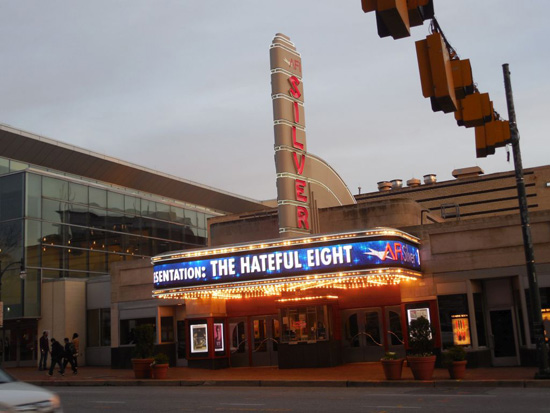 I
had never seen a movie two days in a row, and never seen a new movie twice
unless I'm travelling and wish to see a historic movie theater but over
Christmas weekend, I enjoyed director Quentin Tarantino's 70mm Roadshow
presentation of the 3 hour epic “The Hateful Eight” two days in a row at the AFI Silver in suburban Washington D.C. I
had never seen a movie two days in a row, and never seen a new movie twice
unless I'm travelling and wish to see a historic movie theater but over
Christmas weekend, I enjoyed director Quentin Tarantino's 70mm Roadshow
presentation of the 3 hour epic “The Hateful Eight” two days in a row at the AFI Silver in suburban Washington D.C.The only new 70mm movies that I have seen since “Hamlet” (1996) were “Interstellar” (2014) and “The Master” (2012) both of which I saw on the huge screen of New York City's Ziegfeld Theatre. Being a mainstream movie theater with a huge seating capacity, the Ziegfeld skipped “The Hateful Eight” to showcase the “Star Wars 7” I live in Philadelphia, which was about to have its first 70mm screenings in many years with “The Hateful Eight” but in mainstream movie chain multiplexes without horizontal masking for the 2.76 aspect ratio image of the Ultra Panavision 70 process used for “The Hateful Eight” and without a curtain. So, I decided to see Tarantino's new movie while on my annual holiday weekend in D.C. I've written about my experience over the last three years with the AFI's 70mm classic film series which included the last Ultra Panavision 70 film “Khartoum” (1966). I've seen only one other film projected in its original 2.76 ratio, which was the digitally restored “Ben Hur”: (1956), which I saw in 2014 in a classic screening at the UA King of Prussia multiplex in Philadelphia's burbs. |
More in 70mm reading: Quentin Tarantino's "The Hateful Eight" in Ultra Panavision 70 What did you think about the 7OMM Road Show Version of The Hateful Eight? AFI's Spectacular 70MM Festival "Interstellar" in 70MM at the Ziegfeld in New York Internet link: |
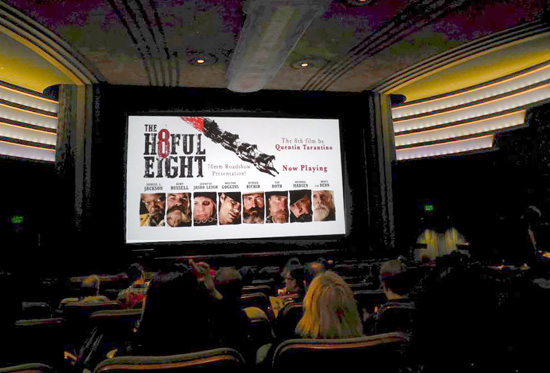 “The
Hateful Eight” became the 1st roadshow of any new movie that I've seen! The
70mm classics hadn't sold out, but with the popularity of Tarantino's films,
just as people did decades ago with roadshow movies, I purchased my ticket
in advance. Long ago, advance tickets were often purchased via mail, but now
I acquired mine via the theater's website. The ticket was a bit pricier at
$20 for everybody, whereas general admission for an evening film at the AFI
is $13 with tickets less expensive for matinees, members, seniors, and
cheapest for children during holidays, at $5. “The
Hateful Eight” became the 1st roadshow of any new movie that I've seen! The
70mm classics hadn't sold out, but with the popularity of Tarantino's films,
just as people did decades ago with roadshow movies, I purchased my ticket
in advance. Long ago, advance tickets were often purchased via mail, but now
I acquired mine via the theater's website. The ticket was a bit pricier at
$20 for everybody, whereas general admission for an evening film at the AFI
is $13 with tickets less expensive for matinees, members, seniors, and
cheapest for children during holidays, at $5. I rode Amtrak to D.C. Saturday December 26, and then took the Metro's Red Line subway to northwest D.C., checked into my hotel, rode the Red Line downtown for lunch and sightseeing, and then the Red Line in its other direction, to Silver Spring, where I saw the sparsely attended 1:45 PM “The Danish Girl” in digital projection at the AFI's auditorium # 3. |
|
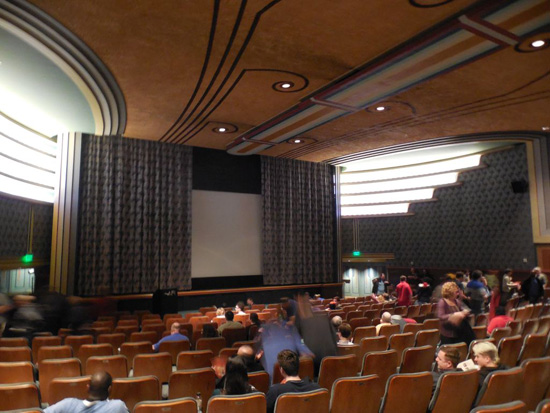 After
I lined up early for my choice of seat in the historic auditorium # 1, for
the “The Hateful Eight” an usher handed me the first souvenir program that I
had ever received at a movie, so the price didn't seem so high. I consider
it a special experience to enjoy a movie in a full house, and indeed, the
afternoon and evening shows over the weekend did sell out. Preshow slides
greeted the audience. I sat 4 rows from the rear of the raked auditorium,
preferring the sight line. The website stated the film itself would begin
promptly at 6:45 PM with no trailers or anything else after the scheduled
time. The curtain closed and a staffer went on stage and cautioned the
audience not to think projection was broken as Overture and Intermission
music would occur with the curtain closed, that there would be a 10 to 12
minute Intermission 1 hour 40 minutes into the film, and that beverages
including a bar would be for sale at the auditorium's rear in case people
didn't wish to miss any of the movie to exit for the usual concession
stands. That was the first time I saw champagne or wine sold inside a movie
auditorium. After
I lined up early for my choice of seat in the historic auditorium # 1, for
the “The Hateful Eight” an usher handed me the first souvenir program that I
had ever received at a movie, so the price didn't seem so high. I consider
it a special experience to enjoy a movie in a full house, and indeed, the
afternoon and evening shows over the weekend did sell out. Preshow slides
greeted the audience. I sat 4 rows from the rear of the raked auditorium,
preferring the sight line. The website stated the film itself would begin
promptly at 6:45 PM with no trailers or anything else after the scheduled
time. The curtain closed and a staffer went on stage and cautioned the
audience not to think projection was broken as Overture and Intermission
music would occur with the curtain closed, that there would be a 10 to 12
minute Intermission 1 hour 40 minutes into the film, and that beverages
including a bar would be for sale at the auditorium's rear in case people
didn't wish to miss any of the movie to exit for the usual concession
stands. That was the first time I saw champagne or wine sold inside a movie
auditorium. |
|
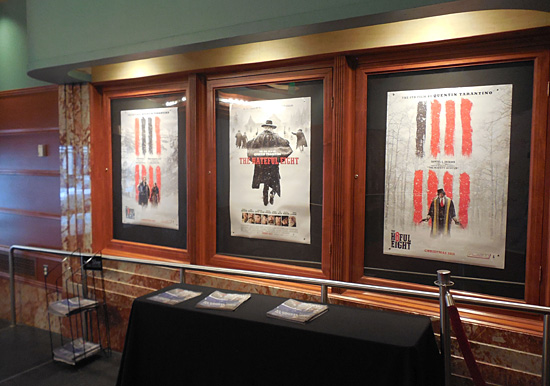 Following
the overture music, the curtain opened. Reviews were across the board,
ranging from 5 stars from the UK's The Guardian and The Telegraph, to
considerably less acclaim. I had found Tarantino's “Pulp Fiction” (1994) at
the time of its release to be too violent, but that landmark movie
influenced changes in movies and television to the extent that I've become
acclimated to more violent shows. Tarantino's most recent movies,
“Inglorious Bastards” (2009) and “Django Unchained” (2012) are among my most favorite movies of recent years and
“The Hateful Eight” did not disappoint.
The wide screen Western vistas were stellar. The plot was engrossing and
utilized not only the Western bounty hunter themes but also the post Civil
War divide between whites and blacks, and North and South, much as “Django
Unchained” focused on similar conflicts pre Civil War. “The Hateful Eight”
is violent, racy, and humorous and it is an ode to old fashioned filmmaking
and film presentation. The AFI's presentation was perfect. The intermission
was a few minutes longer than expected to allow for the concession line, and
a long line at the restroom not for women as more typical, but for the men
who greatly outnumbered the women in the audience. As the curtain closed for
intermission, I couldn't photograph the blank screen in its entirety, as it
was only blank for seconds. I asked, and a projectionist told me the sound
on the film is 5.1 digital surround, with the dialogue from the center
rather than left and right. Ennio Morricone's
score and all of the surround
sound was great. Following
the overture music, the curtain opened. Reviews were across the board,
ranging from 5 stars from the UK's The Guardian and The Telegraph, to
considerably less acclaim. I had found Tarantino's “Pulp Fiction” (1994) at
the time of its release to be too violent, but that landmark movie
influenced changes in movies and television to the extent that I've become
acclimated to more violent shows. Tarantino's most recent movies,
“Inglorious Bastards” (2009) and “Django Unchained” (2012) are among my most favorite movies of recent years and
“The Hateful Eight” did not disappoint.
The wide screen Western vistas were stellar. The plot was engrossing and
utilized not only the Western bounty hunter themes but also the post Civil
War divide between whites and blacks, and North and South, much as “Django
Unchained” focused on similar conflicts pre Civil War. “The Hateful Eight”
is violent, racy, and humorous and it is an ode to old fashioned filmmaking
and film presentation. The AFI's presentation was perfect. The intermission
was a few minutes longer than expected to allow for the concession line, and
a long line at the restroom not for women as more typical, but for the men
who greatly outnumbered the women in the audience. As the curtain closed for
intermission, I couldn't photograph the blank screen in its entirety, as it
was only blank for seconds. I asked, and a projectionist told me the sound
on the film is 5.1 digital surround, with the dialogue from the center
rather than left and right. Ennio Morricone's
score and all of the surround
sound was great. |
|
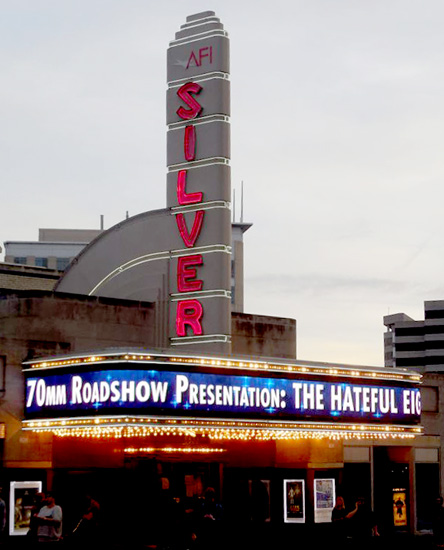 The next afternoon I saw another movie elsewhere in 4k digital projection.
As I've experienced in the past, the new movie didn't look anywhere near as
good on the screen as the 70mm film did. It was like when I returned from
Belgium and could not enjoy American french fries for six months. Tarantino
has stated that digital movies are “TV in public.” So for my evening movie,
I returned to the AFI to see again “The Hateful Eight” arriving early enough
to purchase a ticket. This time, I sat half way in the auditorium, 8 rows
from the screen, 8 rows from the rear. I wasn't happy when I sat close to
see “Patton” (1970) though the 70mm details were great because I felt I was
looking up at the screen rather than at it. “The Hateful Eight” Ultra
Panavision 70
presentation is less tall, since though 2.76 fills the entire screen's width
rather than the 2.2 aspect ratio of “Patton” the screen is masked to be less
tall for 2.76. So I wasn't really looking up so much, and was not
uncomfortable. I was better able to see all the 70mm details including
little balls hanging from the hat of the stage coach driver and various
lotion bottles of the haberdashery. With so many characters, it was
worthwhile seeing the film a second time. This screening was even better, as
the curtain was closed before the film, with no preshow slides shown this
time. After the curtain closed and the closing music finished, I rode the
Red Line to go back to my hotel, and saw others had the souvenir program in
their hands. These days, it is more common to see people outside theaters with
playbills of live shows, not movies, but these screenings were truly
special. Let's hope that unlike the rare new silent or black and white
movies, that there's more 70mm Roadshows of new movies! The next afternoon I saw another movie elsewhere in 4k digital projection.
As I've experienced in the past, the new movie didn't look anywhere near as
good on the screen as the 70mm film did. It was like when I returned from
Belgium and could not enjoy American french fries for six months. Tarantino
has stated that digital movies are “TV in public.” So for my evening movie,
I returned to the AFI to see again “The Hateful Eight” arriving early enough
to purchase a ticket. This time, I sat half way in the auditorium, 8 rows
from the screen, 8 rows from the rear. I wasn't happy when I sat close to
see “Patton” (1970) though the 70mm details were great because I felt I was
looking up at the screen rather than at it. “The Hateful Eight” Ultra
Panavision 70
presentation is less tall, since though 2.76 fills the entire screen's width
rather than the 2.2 aspect ratio of “Patton” the screen is masked to be less
tall for 2.76. So I wasn't really looking up so much, and was not
uncomfortable. I was better able to see all the 70mm details including
little balls hanging from the hat of the stage coach driver and various
lotion bottles of the haberdashery. With so many characters, it was
worthwhile seeing the film a second time. This screening was even better, as
the curtain was closed before the film, with no preshow slides shown this
time. After the curtain closed and the closing music finished, I rode the
Red Line to go back to my hotel, and saw others had the souvenir program in
their hands. These days, it is more common to see people outside theaters with
playbills of live shows, not movies, but these screenings were truly
special. Let's hope that unlike the rare new silent or black and white
movies, that there's more 70mm Roadshows of new movies! |
|
| Go: back - top - back issues - news index Updated 22-01-25 |
